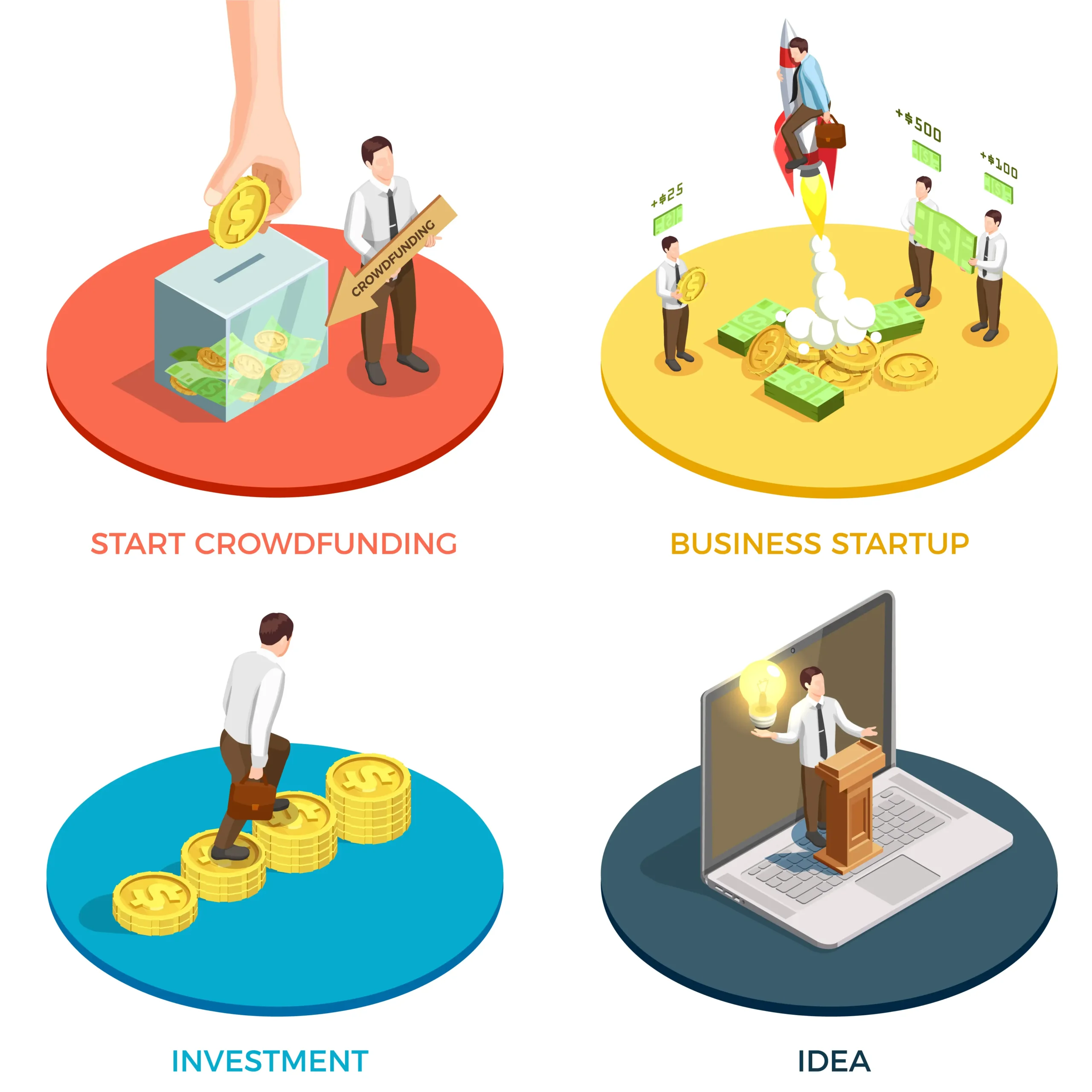Starting a small business takes more than just a great idea; it requires resources, and often, a considerable amount of capital. While enthusiasm and hard work are essential, cash flow keeps the wheels turning. If you’re seeking funding help for your small business, you’re not alone. Small business owners everywhere face financial challenges, especially in the early stages or when trying to expand.
Why funding help for small business
Startup Costs

Starting a business can be expensive. Between buying equipment, securing a location, getting licenses, and marketing your product or service, the costs add up quickly. Many entrepreneurs underestimate how much they’ll need to get started, leading to cash shortages before the business can even take off.
Operating Expenses

Once your business is up and running, daily operational costs such as inventory, payroll, utilities, and marketing will continue to require funding. Consistent cash flow is essential for covering these expenses, especially during slow periods.
Expansion and Growth
As your business grows, you may need additional funds for new locations, more employees, or expanded marketing efforts. Without the right funding, growth opportunities can pass you by.
Types of Small Business Funding
Equity Financing
In equity financing, you give investors a share of your business in exchange for capital. While this can be a great way to raise funds without going into debt, you do give up some control over your business.
Debt Financing
Debt financing involves borrowing money (typically through loans) and repaying it with interest. This is one of the most common forms of small business funding and allows you to retain full ownership, but it also means managing monthly payments and potential debt accumulation.
Grants
Small business grants are essentially free money, which makes them highly desirable. However, they can be difficult to obtain due to competition and strict eligibility requirements.
Crowdfunding
Crowdfunding platforms allow businesses to raise small amounts of money from a large number of people. This can be in exchange for rewards, equity, or simply as a donation. It’s a great way to validate your business idea while securing funds.
Government Grants and Programs
Overview of Government Support for Small Businesses
Government grants can be a significant help, but they usually come with very specific eligibility criteria. In the U.S., organizations like the Private company Organization (SBA) offer awards designated at explicit kinds of organizations, like those associated with exploration, innovation, or local area improvement.
How to Apply for Government Grants
The application process for government grants can be long and complex. You’ll need a solid business plan and a clear idea of how the funds will be used. Make sure to read the requirements carefully and adhere strictly to deadlines.
Popular Government Grant Programs
Some of the most popular programs include the SBA’s Small Business Innovation Research (SBIR) and Small Business Technology Transfer (STTR) programs. Other sources include state and local government grants, which can be less competitive than federal options.
Small Business Loans

Types of Small Business Loans
There are many types of small business loans available, including term loans, lines of credit, and equipment financing. Term loans are lump sums repaid over time, while lines of credit work like credit cards, providing flexible access to funds as needed.
How to Qualify for a Small Business Loan
To qualify for a loan, you’ll typically need a strong business plan, a good credit score, and, in some cases, collateral. Lenders want to ensure they’ll get their money back, so demonstrating profitability and financial stability is key.
Traditional Banks vs. Online Lenders
While traditional banks offer stability and often lower interest rates, they can also have stricter requirements. Online lenders, on the other hand, may approve loans more quickly, but with higher interest rates.
Microloans
What Are Microloans?
Microloans are small loans, usually under $50,000, aimed at helping new businesses or those with limited access to traditional financing. They’re perfect for startups needing modest capital.
Benefits of Microloans for Small Businesses
The primary benefit is that microloans are easier to obtain than larger loans. They’re ideal for small businesses that need a quick infusion of cash without large debt burdens.
Best Sources for Microloans
The SBA and non-profit organizations like Accion are popular sources for microloans. They often provide lower interest rates and more lenient terms than traditional lenders.
Crowdfunding as a Funding Option

How Crowdfunding Works
Crowdfunding involves raising funds by asking a large group of people to each contribute a small amount. This can be done via platforms like Kickstarter, Indiegogo, or GoFundMe.
Types of Crowdfunding
There are several types of crowdfunding:
- Reward-Based Crowdfunding: You offer rewards, such as early access to your product, in exchange for funding.
- Equity Crowdfunding: Investors receive shares in your company in exchange for their contributions.
Crowdfunding Platforms for Small Businesses
Popular platforms include Kickstarter for creative projects and Indiegogo for a broader range of campaigns. For equity crowdfunding, platforms like SeedInvest and Crowdcube are worth considering.
Angel Investors and Venture Capital
What Angel Investors Look for in a Business
Angel investors provide funding in exchange for equity, usually focusing on startups with high growth potential. They often look for strong leadership, innovative ideas, and scalability.
The Role of Venture Capital in Small Business Funding
Venture capitalists (VCs) invest in businesses with the potential for significant returns. While VCs typically focus on larger businesses, they occasionally invest in high-potential small companies.
Differences Between Angel Investors and Venture Capitalists
Angel investors are typically individuals investing their own money, while VCs represent firms investing on behalf of a group. Angels are more likely to invest smaller amounts at early stages, whereas VCs look for bigger returns and later-stage involvement.
Peer-to-Peer Lending (P2P)

How P2P Lending Works
Peer-to-peer lending platforms match small business owners with individual investors. The platforms facilitate the loan process, and in return, both parties benefit from more flexible terms.
Pros and Cons of P2P Lending
The advantage is quicker access to funds without the red tape of traditional banks. However, the interest rates can be higher, and there is less regulation, so you need to vet the platform carefully.
Best P2P Platforms for Small Businesses
Popular platforms include LendingClub and Prosper, both of which offer streamlined lending processes and accessible options for small business owners.
Bootstrapping: Self-Funding Your Business
What Is Bootstrapping?
Bootstrapping means starting and growing your business using your own personal savings, revenue from the business, or low-cost strategies.
Advantages and Disadvantages of Bootstrapping
The main advantage of bootstrapping is that you retain full control over your business without taking on debt or giving up equity. However, it can limit how quickly you can grow and leave you financially vulnerable.
Tips for Bootstrapping Your Business Successfully
To bootstrap effectively, you need to cut unnecessary costs, reinvest profits into the business, and leverage low-cost marketing methods like social media and word of mouth.
Business Credit Cards as a Funding Tool

How to Use Business Credit Cards for Financing
Business credit cards can be useful for covering short-term expenses. They offer flexibility and rewards, but only if used responsibly to avoid high-interest debt.
The Benefits and Risks of Business Credit Cards
The benefit is convenience and potential rewards like cash back or travel points. The risk, however, lies in high interest rates and fees if you don’t pay off the balance each month.
Non-Profit Organizations and Community Development Programs
How Non-Profits Support Small Business Funding
Non-profit organizations often provide grants, low-interest loans, or mentorship programs to help small businesses thrive. Many focus on underserved communities.
Community Development Financial Institutions (CDFIs)
CDFIs offer financial services and products specifically designed for small businesses in disadvantaged areas. They’re a great resource if you’re struggling to secure traditional financing.
How to Prepare for Funding Applications
Organizing Your Business Plan
Having a clear, detailed business plan is crucial. Investors and lenders want to know how you plan to use their funds and when they can expect returns.
Financial Statements and Credit History
Good financial records and a solid credit history increase your chances of getting approved for funding. Be sure to keep your documents organized and up to date.
Common Mistakes to Avoid
Don’t make the mistake of applying for funding without researching the options thoroughly. Avoid over-borrowing, and don’t rely solely on one source of funding for all your needs.
Conclusion
Funding is a critical aspect of starting, maintaining, and growing a small business. Whether you’re seeking a loan, applying for a grant, or launching a crowdfunding campaign, the right option depends on your unique needs. By understanding the variety of funding sources available, you can make informed decisions that will support the long-term success of your business. Stay proactive, research all options, and don’t be afraid to get creative with your funding strategies!
Funding Help for Small BusinessFunding Help for Small BusinessFunding Help for Small BusinessFunding Help for Small BusinessFunding Help for Small BusinessFunding Help for Small BusinessFunding Help for Small BusinessFunding Help for Small BusinessFunding Help for Small BusinessFunding Help for Small Business
FAQs
What is the easiest type of funding to get for a small business?
Grants and microloans are generally easier for small businesses to obtain than large loans or venture capital, but they often come with specific eligibility requirements.
How can I improve my chances of getting a small business loan?
To improve your chances, maintain a solid credit score, prepare a comprehensive business plan, and ensure you have strong financial records.
Are there any free funding options available for small businesses?
Yes, grants are a free funding option that doesn’t require repayment. However, they are competitive and often difficult to obtain.
How can I find an angel investor for my business?
Look into local business networking events, pitch competitions, and online platforms like AngelList to connect with potential investors.
What are the best online crowdfunding platforms for small businesses?
Kickstarter and Indiegogo are popular platforms for reward-based crowdfunding, while SeedInvest and Crowdcube are good options for equity crowdfunding.




